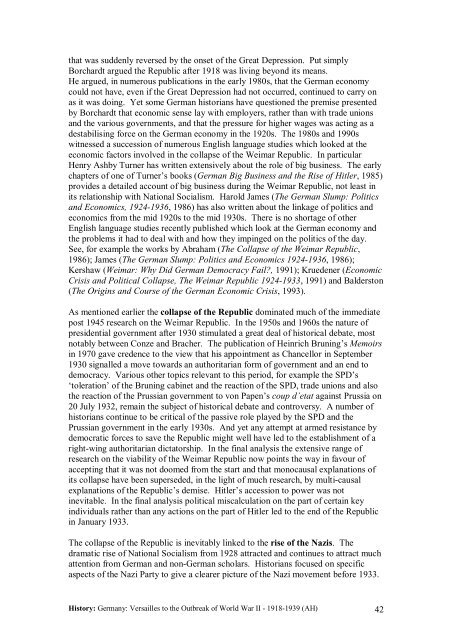PDF file: History - Advanced Higher - Germany - Education Scotland
PDF file: History - Advanced Higher - Germany - Education Scotland
PDF file: History - Advanced Higher - Germany - Education Scotland
You also want an ePaper? Increase the reach of your titles
YUMPU automatically turns print PDFs into web optimized ePapers that Google loves.
that was suddenly reversed by the onset of the Great Depression. Put simply<br />
Borchardt argued the Republic after 1918 was living beyond its means.<br />
He argued, in numerous publications in the early 1980s, that the German economy<br />
could not have, even if the Great Depression had not occurred, continued to carry on<br />
as it was doing. Yet some German historians have questioned the premise presented<br />
by Borchardt that economic sense lay with employers, rather than with trade unions<br />
and the various governments, and that the pressure for higher wages was acting as a<br />
destabilising force on the German economy in the 1920s. The 1980s and 1990s<br />
witnessed a succession of numerous English language studies which looked at the<br />
economic factors involved in the collapse of the Weimar Republic. In particular<br />
Henry Ashby Turner has written extensively about the role of big business. The early<br />
chapters of one of Turner’s books (German Big Business and the Rise of Hitler, 1985)<br />
provides a detailed account of big business during the Weimar Republic, not least in<br />
its relationship with National Socialism. Harold James (The German Slump: Politics<br />
and Economics, 1924-1936, 1986) has also written about the linkage of politics and<br />
economics from the mid 1920s to the mid 1930s. There is no shortage of other<br />
English language studies recently published which look at the German economy and<br />
the problems it had to deal with and how they impinged on the politics of the day.<br />
See, for example the works by Abraham (The Collapse of the Weimar Republic,<br />
1986); James (The German Slump: Politics and Economics 1924-1936, 1986);<br />
Kershaw (Weimar: Why Did German Democracy Fail?, 1991); Kruedener (Economic<br />
Crisis and Political Collapse, The Weimar Republic 1924-1933, 1991) and Balderston<br />
(The Origins and Course of the German Economic Crisis, 1993).<br />
As mentioned earlier the collapse of the Republic dominated much of the immediate<br />
post 1945 research on the Weimar Republic. In the 1950s and 1960s the nature of<br />
presidential government after 1930 stimulated a great deal of historical debate, most<br />
notably between Conze and Bracher. The publication of Heinrich Bruning’s Memoirs<br />
in 1970 gave credence to the view that his appointment as Chancellor in September<br />
1930 signalled a move towards an authoritarian form of government and an end to<br />
democracy. Various other topics relevant to this period, for example the SPD’s<br />
‘toleration’ of the Bruning cabinet and the reaction of the SPD, trade unions and also<br />
the reaction of the Prussian government to von Papen’s coup d’etat against Prussia on<br />
20 July 1932, remain the subject of historical debate and controversy. A number of<br />
historians continue to be critical of the passive role played by the SPD and the<br />
Prussian government in the early 1930s. And yet any attempt at armed resistance by<br />
democratic forces to save the Republic might well have led to the establishment of a<br />
right-wing authoritarian dictatorship. In the final analysis the extensive range of<br />
research on the viability of the Weimar Republic now points the way in favour of<br />
accepting that it was not doomed from the start and that monocausal explanations of<br />
its collapse have been superseded, in the light of much research, by multi-causal<br />
explanations of the Republic’s demise. Hitler’s accession to power was not<br />
inevitable. In the final analysis political miscalculation on the part of certain key<br />
individuals rather than any actions on the part of Hitler led to the end of the Republic<br />
in January 1933.<br />
The collapse of the Republic is inevitably linked to the rise of the Nazis. The<br />
dramatic rise of National Socialism from 1928 attracted and continues to attract much<br />
attention from German and non-German scholars. Historians focused on specific<br />
aspects of the Nazi Party to give a clearer picture of the Nazi movement before 1933.<br />
<strong>History</strong>: <strong>Germany</strong>: Versailles to the Outbreak of World War II - 1918-1939 (AH) 42
















